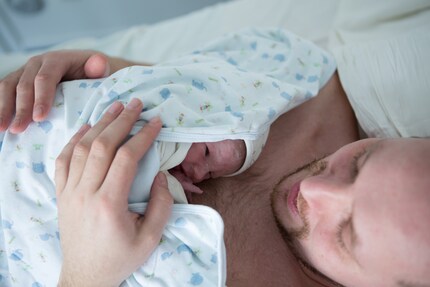
News + Trends
GDF15 culprit: it is now clear why many pregnant women get sick
by Katja Fischer

Expectant and new parents are bombarded with countless snippets of baby wisdom. But which ones are true, and which ones are nothing but humbug? It’s high time to put these myths to the test – in part one: co-pregnancy.
«We’re pregnant» is something fathers-to-be like to say to express solidarity with their partner. Or «I’m pregnant with you» when they make fun of their sizeable gut, increasing in tandem with that of the mother-to-be. It’s just a quick quip, little importance is attached to these sayings. Expectant dads simply put on a few extra kilos during pregnancy.
But that’s only half the truth. Some men develop far more symptoms that are actually typical for pregnant women. Both physical and emotional – mood swings, for example, nausea, even vomiting. What seems absurd is actually quite real. Fathers can in fact be co-pregnant – or at least seemingly pregnant adjacent. And the phenomenon has a name – Couvade syndrome.

The term is derived from the French verb «couver», meaning «to incubate», and stems from ethnology. Couvade (site in German) goes back to traditional rituals among certain cultures where fathers prepare for the birth of their child. They lie in bed during childbirth and imitate their wives to keep evil spirits away.
Science has been using the term Couvade to describe the phenomenon of parallel pregnancy since the end of the 19th century. Various studies have since confirmed the syndrome. In contrast to cultural customs, however, pregnancy symptoms aren’t deliberately imitated in Couvade syndrome. They’re often not even consciously noticed. That, or they only become clear afterwards, as German fatherhood coach and author Klaus Althoff points out in an interview with Men’s Health (in German). «Many also conceal their co-pregnancy out of shame or embarrassment.»
It’s therefore unclear how many men are affected by Couvade. International studies indicate a range of between 11 and 97 per cent. In an interview with Zeit Online (interview in German), psychologist Harald Werneck from the University of Vienna, who has been researching fathers for almost 20 years, guesses that a figure between 10 and 30 per cent is plausible. In other words, around one in five fathers shows Couvade symptoms.
And these symptoms can be manifold. In a 2007 study by the University of London, men reported physical complaints such as stomach cramps, back pain, morning sickness, vomiting, cravings and fatigue. Some even grew a «baby bump». One father even felt pain similar to his wife’s contractions during the birth. The men reported feeling thin-skinned and experiencing mood swings as psychosomatic symptoms.
An Indian study from 2014 revealed similar findings. Expectant fathers complained of indigestion, ravenous hunger, changes in appetite, headaches and tiredness. In both studies, the symptoms occurred particularly in the first and last three months of the partner’s pregnancy.
It’s unclear where co-pregnancy comes from. While psychologists look for the cause in behavioural patterns, biologists blame the hormonal balance. Hormonal causes are indicated by dropping testosterone levels in expectant fathers. On the other hand, the production of the bonding hormone oxytocin increases, as does that of the milk-bonding hormone prolactin, just as it does in the expectant mother.

Viennese psychology professor Harald Werneck suspects an interplay between psychological processes and hormones. He assumes that particularly empathetic men feel their pregnant partner’s pain so acutely that they unconsciously imitate their symptoms. According to research by Zeit Online (article in German), co-pregnancy occurs particularly frequently in same-sex relationships, as can be seen from parents’ forums online.
This empathy is also reflected when it comes to eating. Ulrike Hauffe, a qualified psychologist and childbirth educator from Bremen, ran a study with 150 men, discovering an average weight gain of four kilogrammes. An online survey (in German) conducted by a British market research company with 5,000 fathers even showed a weight gain of more than six kilos. What did the fathers say? Apparently, they’d gone out to eat with their partner more often, had eaten more sweets and their partners had cooked larger portions than usual.
Weight gain out of solidarity is the most common symptom of a parallel pregnancy, and at the same time the longest lasting. Because while the other symptoms soon disappear after the postpartum period, the extra kilos remain for the time being. A small consolation: postnatal courses for fathers are now also a thing.
Which exciting baby wisdoms should be put to the test? Which bizarre pregnancy myth have you heard of? Write to me in the comments below or via e-mail.
Mom of Anna and Elsa, aperitif expert, group fitness fanatic, aspiring dancer and gossip lover. Often a multitasker and a person who wants it all, sometimes a chocolate chef and queen of the couch.
Interesting facts about products, behind-the-scenes looks at manufacturers and deep-dives on interesting people.
Show all
Background information
by Olivia Leimpeters-Leth

Background information
by Michael Restin

Background information
by Patrick Vogt